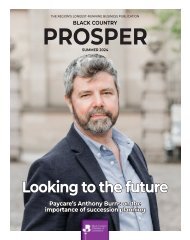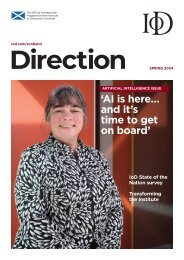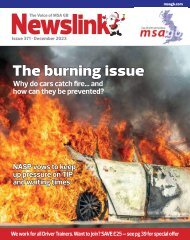IoD Scotland Autumn 2021
Institute of Directors Scotland, business magazine, directors
Institute of Directors Scotland, business magazine, directors
Create successful ePaper yourself
Turn your PDF publications into a flip-book with our unique Google optimized e-Paper software.
that the internet was global so there was<br />
no point just trying to be the best tech<br />
business in <strong>Scotland</strong>. We had to compete<br />
with the best in the world – we had to<br />
match Google and be world-class at<br />
all levels. So we have to learn from the<br />
world, too.”<br />
The thought of sharing ideas with<br />
potential rivals is the type of idea<br />
that may horrify some CEOs, yet it’s a<br />
concept on which the tech sector has<br />
long thrived. “The reason Silicon Valley<br />
succeeded was because it attracted<br />
a critical mass of talent that created<br />
a virtuous network within which<br />
businesses flourish. If you are going to<br />
become a digital leader you need to get<br />
to that tipping point where you have<br />
more and more successful businesses<br />
that in turn attract more talented people.<br />
“When I started out at Atlantech it<br />
felt like we were the only people in the<br />
world doing what we were doing. We<br />
were on our own. It’s not like that now<br />
in <strong>Scotland</strong>; there are so many digital<br />
companies out there, it’s such an exciting<br />
and vibrant picture. I’ve never felt so<br />
excited about our digital future and<br />
when I talk to start-ups there’s a real<br />
belief that they can succeed.”<br />
Some of that belief stems from the<br />
success of Skyscanner, of course. “I’d<br />
be delighted if people said they were<br />
“Climate change has us locked<br />
in an enormous ‘tragedy of the<br />
commons’. We used to talk about<br />
it affecting our grandchildren but<br />
not any more; it’s affecting us,<br />
right now. We must act.”<br />
inspired by the Skyscanner story,<br />
proving that a tech firm could scale-up<br />
and succeed in <strong>Scotland</strong>. The great thing<br />
about that company was so many people<br />
joined us, developed and grew, then<br />
left and set up their own businesses. I<br />
always said my greatest ambition was for<br />
100 new ‘Skyscanners’ to be born from<br />
Skyscanner. That’s how Silicon Valley<br />
started.”<br />
Can <strong>Scotland</strong> ’s latest tech start-ups<br />
scale-up in the same way? “Absolutely,<br />
as long as we get the ecosystem right.<br />
Make sure the talent is there, make sure<br />
we can share ideas, get the funding in…<br />
and anything is possible. As I said before,<br />
we are a start-up nation, we always have<br />
been. We need to remember that now.”<br />
There is something else Mark is keen to<br />
remind us: the aforementioned challenge<br />
of climate change. “It’s the biggest<br />
threat we’ve ever faced and yet we’re<br />
sleepwalking into a disaster,” he says<br />
ruefully. “It’s the modern equivalent of<br />
’the tragedy of the commons’ ” – [the<br />
situation, first suggested in 1833 by<br />
British economist William Forster Lloyd,<br />
in which individual farmers with open<br />
access to common land for grazing act<br />
in their own self-interest and, contrary<br />
to the common good of all users, cause<br />
depletion of the resource – and its<br />
eventual collapse - through their uncoordinated<br />
action, to the detriment of all].<br />
“When that happens we all starve<br />
in the end, and that’s exactly what’s<br />
threatening us now. It’s hard to break out<br />
of our current way of acting and thinking<br />
as it is seductive to receive the benefits<br />
of our carbon consumption in the shortterm<br />
and to think climate change won’t<br />
happen or won’t affect us – it will. We<br />
are locked as a species in an enormous<br />
tragedy of the commons. We used to<br />
talk about it affecting our grandchildren<br />
but not anymore; we are passing into<br />
the second half of the exponential, it’s<br />
affecting us, right now. We must act<br />
right now.”<br />
His desire for an immediate coherent<br />
response explains his frustration with the<br />
reaction to the release of the UN IPCC<br />
report in August. Its conclusion was that<br />
climate change was ‘widespread, rapid<br />
and intensifying’.<br />
“It was terrifying,” says Mark. “It<br />
was unequivocal on the science and<br />
provided the data to measure the<br />
impact. Yet we got no real response<br />
from governments; what is the wake-up<br />
call we need before it is too late, if that<br />
report wasn’t?”<br />
Mark is baffled by a lack of funding<br />
into new technology that could offer<br />
answers. “We showed that concerted<br />
efforts could move mountains during the<br />
pandemic, with the search for vaccines,<br />
and we need a similar response now. It’s<br />
a moon landing project. Government<br />
needs to fund and direct companies to<br />
solve the problems.”<br />
He cites a number of areas where<br />
central intervention is a necessity.<br />
“Where’s the comprehensive charging<br />
network for electric cars we need? Why<br />
isn’t that infrastructure in place yet?<br />
“Where is the funding for research<br />
into nascent technology such as green<br />
hydrogen and scaled carbon capture?<br />
AI has helped us make huge bounds in<br />
protein folding prediction; can we use<br />
similar techniques for investigating the<br />
possibilities of fusion modelling?”<br />
But the lead for such work has to<br />
come from the state. “In the USA,<br />
homes contribute 27 per cent of all the<br />
country’s carbon emissions. But it could<br />
decarbonise all its homes by directing<br />
just one per cent of the defence budget<br />
to do so. What’s stopping them?”<br />
It’s an example of what is possible but<br />
“it won’t happen without a dramatic shift<br />
in the government’s thinking; a wartime<br />
urgency is required.”<br />
Is he optimistic of success, starting<br />
from the COP26 Summit? “Honestly? No.<br />
I’m not without hope but one thing Covid<br />
has taught us is that we don’t do the<br />
exponentials well. Problems sneak up on<br />
us and we don’t respond quickly enough.<br />
“We need resolute action, not words;<br />
we have to act now otherwise this is a<br />
war we won’t win.”<br />
<strong>Autumn</strong> <strong>2021</strong><br />
iod.com<br />
15

















